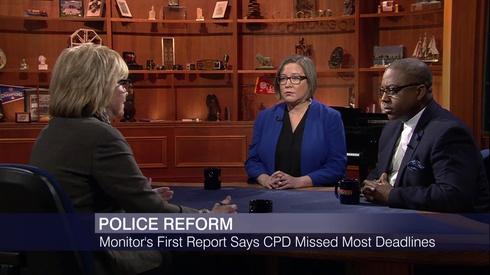Slow Start on Reform at the Chicago Police Department
Paul Caine |
An independent federal monitor tasked with overseeing the reform of the Chicago Police Department says CPD is already falling behind on its efforts.
On Friday, the monitoring team led by Maggie Hickey released its first report on the police department’s progress and revealed it had missed 37 of 50 agreed-upon deadlines for preliminary compliance.
Mayor Lori Lightfoot said Monday that she expects the next monitor’s report – due in another six months – to show more progress.
“The reality is we know in these initial stages we are not going to be hitting every single mark but my expectation is that we are going to moving on a path towards meeting them,” said Lightfoot. “I expect the second report to show that we have made a lot of additional progress.”
Are the missed deadlines just growing pains as the process of reform begins? Or a sign of just how difficult it’s going to be to change the police department?
Karen Sheley, director of the Police Practices Project at the American Civil Liberties Union of Illinois, says the Chicago Police Department will have to change because it doesn’t have a choice.
“They are going to meet the requirements of the consent decree because it’s a court order and unlike every other process that the city has engaged in to reform the department this one is overseen by a federal court,” said Sheley, who is responsible for enforcing the ACLU’s agreement with the city of Chicago and the police department regarding the stop-and-frisk policy. “I am not surprised that there are initial missed deadlines – the deadlines are ambitious. Yet at the end of the day this is a set of reforms that is overseen by a federal court and they are going to have to meet their deadlines.”
Sheley notes the deadlines that have been missed are critical to the reform process.
“One of the policies that haven’t been developed yet is the policy on how the department is going to investigate when officers shoot and kill people,” said Sheley. “That is really fundamental to the work of the decree and to the reason that we have the decree in the first place.”
Another problem identified in the report: the police department’s community engagement efforts, which are seen as crucial to fostering trust in communities of color that have experienced the worst of police abuses.
“One thing that is clear is that the police department has an idea of what community engagement is but their idea is lacking,” said the Rev. Saeed Richardson, director of policy at the Community Renewal Society, a faith-based organization advocating for social, economic and racial justice and part of a coalition of advocacy groups that have been pushing for police reform.
“The police need to understand that they’ve got to take serious note of the things that people say,” said Richardson. “They need to take that information back. If it’s something that they can apply then apply it. If it’s something they can’t apply let the community know why they can’t.”
Richardson is under no illusions that meaningful reform can be accomplished quickly.
“I think it’s going to take a very long time because we are not just talking about changing practices – what police write down on a piece of paper and what gets reported back to a database – we are talking about changing culture.”
And he notes that it is also going to take time for communities that have historically been mistreated by police to begin to trust.
“We are talking about taking time for the community – particularly folks who are black and brown – to actually accept police not as a threat to their existence but as a support system for their lives and the citizens of the city,” said Richardson.
And officers who can’t change – or won’t – will have to move on.
“Some people will just not be able to change, and that’s just real and they are going to have to retire from the force,” said Richardson.
The consent decree runs for a minimum of five years but neither Sheley nor Richardson expect the process of reform to be complete in that timeframe.
“I think it is going to take as long as it needs to take,” said Sheley. “I don’t have any illusions that we are going to turn around the department that has as many problems as the Chicago Police Department in a short period of time or even in five years.”
Richardson said that while his faith gives him optimism for the future, it only goes so far.
“As a person of faith I lean into optimism, I lean into hope. But as a person who is an African American male with children and a wife in this world I also kind of recognize the reality that we have to deal with as well,” he said.







